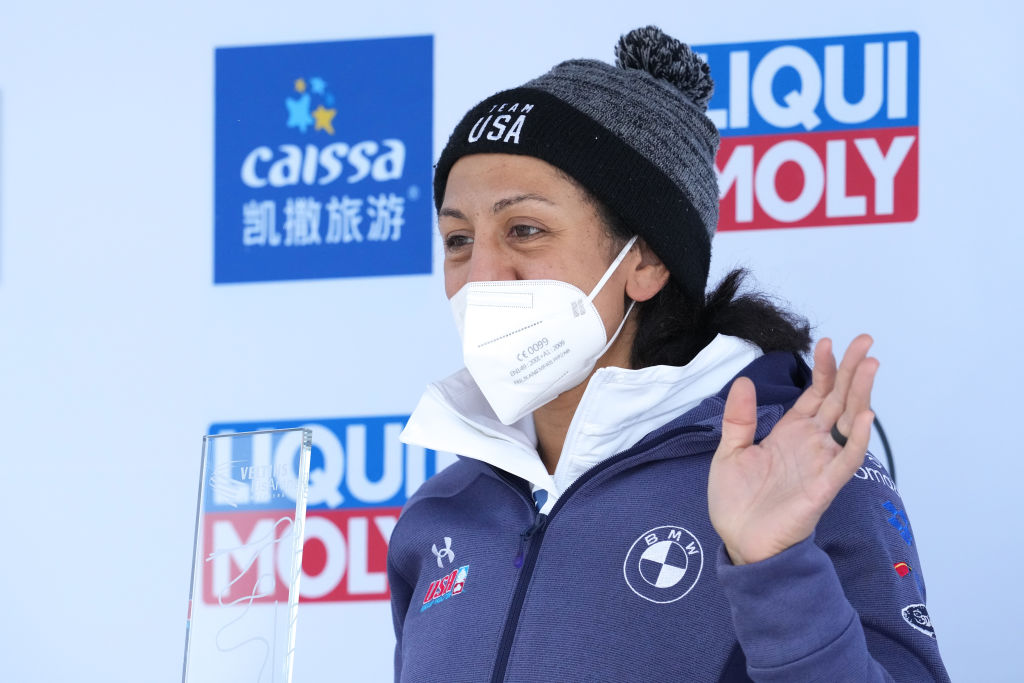
The first U.S. Olympic athlete to reveal a positive COVID-19 test in Beijing is bobsledder Elana Meyers Taylor.
The 37-year-old, who has medaled in the last three winter Games, traveled to the Chinese capital with her son Nico and husband Nic Taylor, who is an alternate on the men’s bobsled team. All three tested positive, she told USA Today. Meyers Taylor said she is asymptomatic, and quarantining alone.
“Getting to the Olympics is never easy, and this time, as a new mom, it has been the most challenging,” said Meyers Taylor in a statement on Twitter. “But also, incredibly rewarding, to be able to show that it can still be done.”
USA Today reporter Nancy Armour tweeted that Meyers Taylor is still nursing, and said she praised both U.S. Olympic officials and the quarantine hotel for getting her a breast pump and helping to transport breast milk to Nico. Meyers Taylor retweeted the message.
“I don’t get to be with my son, which is probably [the] hardest part of all of it,” she told USA Today.
Meyes Taylor arrived in Beijing Jan. 27 and tested positive two days later. “This is just the latest obstacle that my family and I have faced on this journey, so I’m remaining optimistic that I’ll be able to recover quickly and still have the opportunity to compete,” she tweeted.
The women’s monobob event takes place Feb. 13-14 and the two-woman bobsled event is scheduled for Feb 18-19. She’ll need two negative PCR tests 24 hours apart before being cleared from isolation. However, she’ll likely miss out on the chance to train on the track ahead of the Opening Ceremony on Friday. The U.S. Olympic Committee has provided her with a weight plate and suspension bands to help her train in isolation.
Meyers Taylor and her family travelled to Beijing directly from Switzerland, where she competed at the World Cup event Jan. 16. The athlete, who has received both shots of the COVID-19 vaccine and a booster, hasn’t been back to the U.S. since Nov. 10 as she wanted to reduce the risk of catching the virus, she told the newspaper.
More from TIME
She won the silver medal in the two-woman bobsled at the 2014 and 2018 Winter games, and bronze in 2010. She is ranked world No. 1 in both that event and the women’s monobob, which will feature for the first time at the Winter Olympics this year.
Meyers Taylor is not the first Team USA athlete to test positive in the run up to the Games. Josh Williamson, another U.S. bobsledder, revealed in an Instagram post that he tested positive for COVID-19 Jan. 23 before flying out. Williamson said he will take a later flight to the games when he tests negative. A third bobsledder has also tested positive, however, U.S. officials say they hope all three will be able to compete.
China has pledged to put on “simple, safe and splendid” games. Hosted more than two years after the first known outbreak of COVID-19 in Wuhan, the Winter Olympics operate on a “closed loop” system” in which Olympic athletes, officials and media do not come into contact with the general population of China. The system employs daily tests, health-monitoring apps, and special travel lanes.
Many national Olympic committees, including Team USA, have enforced vaccine requirements on athletes and staff.
Yet, breakthrough infections have pushed the total number of positive cases at the games to 200, including 67 among athletes and team officials. More than 466,000 COVID-19 tests have already been administered to athletes and others associated with the Games in Beijing.
China has pursued a zero-COVID policy since the pandemic began, enforcing strict city-wide lockdowns over handfuls of cases. In the run up to the Lunar New Year, citizens in the western city of Xi’an and in the northwestern province of Henan were told to stay at home.
Apart from battling the complications of COVID-19, this year’s Winter games have been tarnished by a diplomatic boycott led by the U.S. over what Washington says are China’s “crimes against humanity in Xinjiang, and other human rights abuses.” Beijing denies the allegations.
More Must-Reads from TIME
- Donald Trump Is TIME's 2024 Person of the Year
- Why We Chose Trump as Person of the Year
- Is Intermittent Fasting Good or Bad for You?
- The 100 Must-Read Books of 2024
- The 20 Best Christmas TV Episodes
- Column: If Optimism Feels Ridiculous Now, Try Hope
- The Future of Climate Action Is Trade Policy
- Merle Bombardieri Is Helping People Make the Baby Decision
Contact us at letters@time.com